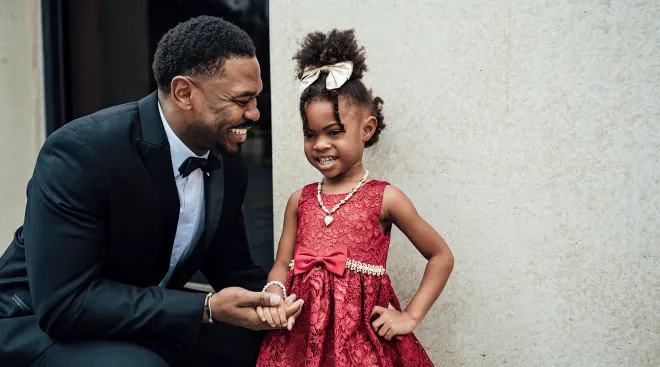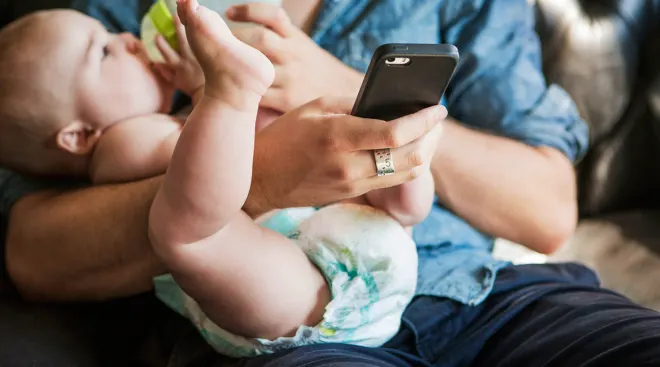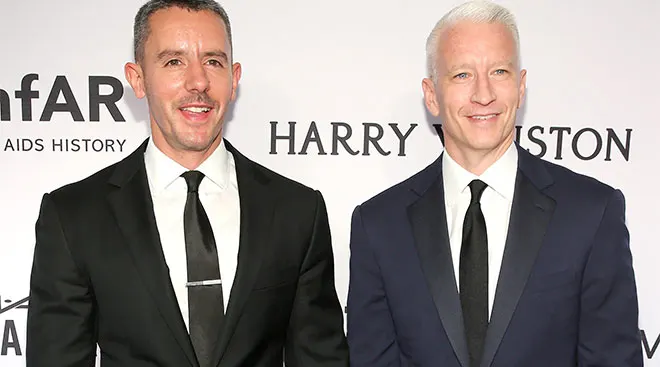How Overly Praising ‘Good Dads’ Stalls Gender Equality
Everywhere my husband goes with my daughter, he gets applause. Bravissimo, young trailblazer, well-meaning women of a certain age cry. He pauses under newly present spotlights, catches bouquets, bows—and unknowingly internalizes the message that he’s not just good enough at this parenting thing, he’s phenomenal.
Until recently, my husband was decidedly “good, not great” at parenting. He was a kind and fun dad, but like many of his “good dad” peers, he relied on me for most of the heavy lifting—the invisible parenting and household labor—thus landing him miles short of phenomenal.
After all, phenomenal parenting (for those in partnered relationships) requires fully embracing the role of equal partner and parent. It means internalizing that both partners share their kids and homes, so they should share the associated responsibilities too.
My husband has always performed numerous household and parenting tasks—including cooking most of our meals, packing lunches, shopping for groceries and ushering our daughter through her bedtime routine. He even accompanied me during all the middle-of-the-night wake-ups when our daughter was an infant, an act I learned was far from the norm among our new parent friends.
But despite his modest domestic contribution, which might have appeared perfectly adequate to the outside observer, our marriage was still far from gender-equitable. For too many years, the mental labor was almost entirely in my lap, including some of the planning behind the tasks he was executing. And does it count as doing a task if you complain about it to your beleaguered wife?
I used to vent this frustration to my new-mom friends, expecting validation and camaraderie (and maybe some light bra-burning), but I came up empty. Compared to their husbands, mine was a star. I had the best-case scenario, they said. I should feel grateful, they said. He cooked and went grocery shopping?!
The cooing over my husband’s so-so domestic performance was a microcosm of a bigger problem—the low, low bar that we as a society have set and locked in place for men. We enable not-good-enough behavior by applauding slightly better behavior and accepting it as the best it gets—by telling dads that peak fathering means doing the least.
But doing regular things like washing dishes or playing with one’s own offspring at the playground doesn’t make one a hero. The bare minimum should be treated as such.
And to all the “good dads” who are all play and no housework, lend me your ear. Parenting is as much how we treat our kids as what we model to them. In partnered heterosexual relationships, when we model that moms give to everyone to the point of exhaustion and dads are free to play and rest, we’re teaching boys to see their time and well-being as more valuable, while teaching girls to look forward to a family life of endless to-do lists, depleted energy reserves and resentment.
In this dynamic, kids end up banking tons of great memories with Fun Dad, not understanding that Fun Dad’s energy reserves are freed up at the expense of Tired Mom’s time and mental health. Moms miss out on the fun, and kids miss out on the best of their moms—the ultimate injustice.
After years of too-slow progress toward parity, the pent-up resentment in the dormant volcano that was me bubbled over, and my husband and I underwent what I’ll call a marital moment of reckoning. I was at the end of my rope. I aired all of my grievances. All of them. Blessedly, he listened.
I came across the work of Zawn Villines, a feminist activist who created a dad privilege checklist, which is a long list of things dads “never have to think about, and never have to feel guilty for not considering.” I showed it to my husband. Despite a score on the checklist that was undoubtedly better than many of his peers (which isn’t saying much), it was a wake-up call. Feeling remorseful and jolted from complacency, he got to work.
Combining the actionable items from Villines’ list, the cards from Eve Rodsky’s “Fair Play” card deck and some extra duties specific to our life, he created a comprehensive task list that he then divided fairly between us.
At long last, my husband is now responsible for most of the invisible work in our household (and more visible work than before), and he’s managing it all beautifully. He made and laminated chore calendars and to-do lists for himself for every circumstance (weeknight checklist, weekend outing checklist, weekday morning checklist) to help him stay on top of his duties. Things feel good.
In finally stepping into his role of equal partner and parent, my husband turned our marriage around. But things never should’ve been what they were. I know I’m far from the only mom who’s bent under the weight of invisible labor or who’s demanded change in her marriage. This inequitable dynamic is pervasive and toxic, and it has to end.
Taking on this work is hard, and since men are socialized their whole lives to do less than their fair share in the domestic sphere, it’s also new. Doing things differently is uncomfortable at first, but sticking with it and pushing through the discomfort is worth it.
Now that my husband is taking up the slack, I have more time and energy to be the “fun parent.” I’m bonding with my daughter more. He’s also connecting with her on a deeper level. I have more mental space for writing. My husband feels a sense of pride and accomplishment in doing the hard parenting and adulting stuff. Our daughter’s general vibe has improved—I think she feels a stronger sense of balance and love in our household. Everybody’s winning.
My husband always said he felt uncomfortable receiving unearned praise from the world—that he found parenting double standards unjust. I believe that his logical mind found these messages problematic. I also know his unconscious mind filed away every undue compliment as evidence that he was doing pretty okay. I know this because he shamefully admitted as much.
To make a major change, a person must first believe they need to, want to and then wholeheartedly commit to putting in the required work. I can see how “good dads” could be unmotivated to reach this level of dedication while receiving positive reinforcement for doing the bare minimum from almost everyone they meet.
This isn’t an excuse for underperforming dads, but it’s an undeniable impediment to their improvement. When the world at large is telling you you’re exceeding expectations—that your effort is more than enough—you might be resistant or even resentful toward the one person telling you otherwise. Wouldn’t it come more naturally to believe that, especially relative to your friends, you’re beyond adequate?
Dads, of course, need to see through society’s messages. They need to step up and be the trailblazers they’re credited to be—to see the status quo for what it is: outdated and oppressive.
At the same time, we all need to do our part to stop delivering those toxic messages and collectively raise the bar for men. They can and should do better—and we need to show them we believe that.
Plus, more from The Bump:
Navigate forward to interact with the calendar and select a date. Press the question mark key to get the keyboard shortcuts for changing dates.
Advertisement
Advertisement
Advertisement
Advertisement




















































